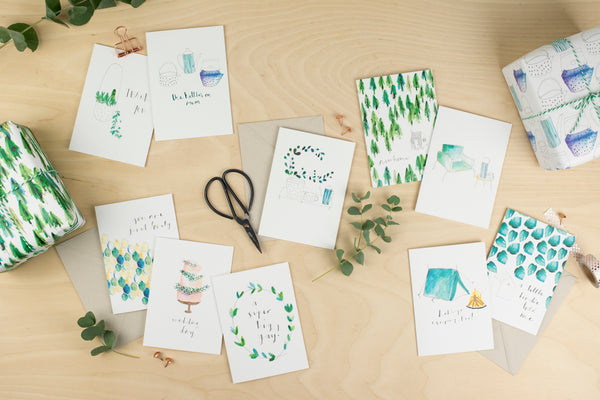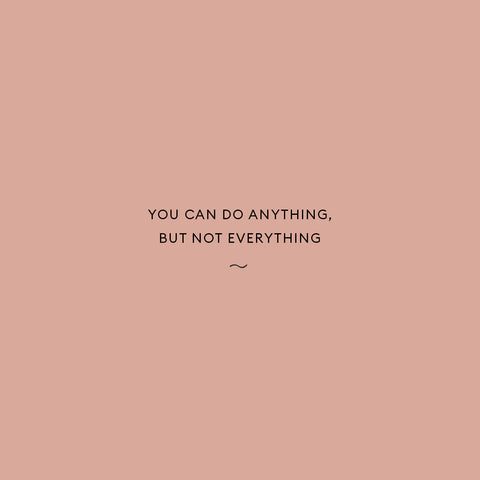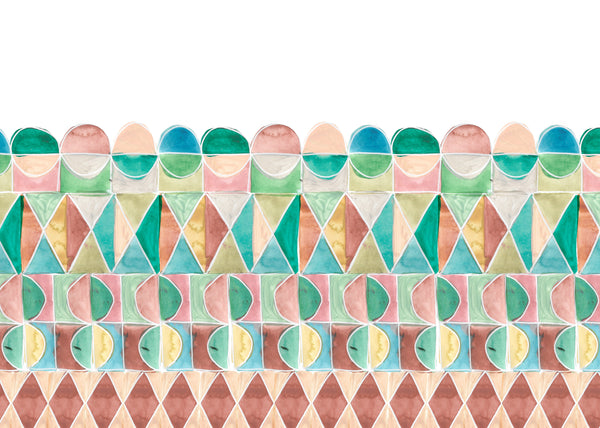7 tips for starting a creative business
I often get asked how came to start my own small business and what advice I would offer to anyone thinking about doing the same. Here are 7 tips for starting a creative business from my experiences over the past four years!
Interestingly "self employment in the UK has grown by 40% since 2000" - The RSA

A little bit of background
I remember so vividly being stood in my part-time retail role and having this simplistic business idea to print my illustrations onto cards and sell them to the world - now wouldn't that be just lovely! Ironically four years later I have exactly the same business vision, which proves my initial concept was strong.
I now feel much more business savvy than I did back then - I have learnt tough business lessons, made many mistakes, sometimes made the wrong decisions, built strong supplier contacts, ridden a business rollercoaster, faced and solved frequent problems. There is still so much more to learn!
If we rewind to 2015, I was constantly illustrating and idea generating alongside my job, wondering how to successfully get my ideas into the market. Asking myself what would be a good starting point? How much money would I need to get things off the ground? Could I expect this venture to pay my bills? Would I enjoy it?
"Since 2010, the creative industries sector now generates 5.5% of the UK economy" - Creative Industries Federation
I started trading in early 2015 alongside my part-time employment, becoming full time self employed later on in the same year. This does not mean that I was making a lot of money, it is important to note everyone has differing personal circumstances and options of when they can put their full time hours into their business. Do not compare yourself to others - your definition of success is most likely to be very different to theirs!

1. Create a strong idea/concept
You have to know what you want to do and be clear about it. It doesn't need to be complicated but it does need to be clear. What are you going to do and how are you going to set yourself apart from others doing the same? What is your USP (unique selling point)?
Inevitably there will be competition in your sector so your idea needs to be robust and well thought out. It's important to jot down every idea you have, big or small. Don't discard it just because you don't think it's weak, do your research and then decide.
I would illustrate cards, print them professionally and my route to market would be to sell directly to shops. You may be interested in the Introduction to Trade post I wrote if this is something you are thinking about. I wanted to create a product that was kind to the environment, but producing eco friendly greetings cards proved to be expensive! Never the less I stuck with that concept and pushed it forward to the research stage.
What is your definition of success? An ethical conscience and a sustainable business or a quick money maker?
2. Research, research, research!
I can't stress this enough! It is vital to do thorough research. Once you have your ideas down on paper spend a good chunk of time researching around the concept, your field, competitors, pricing, route to market, general business adviceetc. Read blogs, articles, books, listen to podcasts, absorb as much information as you possibly can about the sector that you are proposing to do business. This information will shape some of the choices you make before you decide to go ahead!
I am on a constant drive to learn, you will never have all of the answers in small business as curve balls always get thrown in your way and you have to find a solution to a problem very quickly. It's hard juggling family life and finding the time to research, but schedule it into your working week as you would with any other aspect and then you won't be able to push it to the back of the queue!

3. Be sensible and be realistic
Rome wasn't built in a day etc etc! It's often said half of all businesses fail their first year of trading. I have found that being realistic in the goals that you set yourself and your business is key. Financially I set myself a 'business as usual target' and a 'stretch target' each year - both aiming for growth but one more so than the other.
As an entrepreneur of a small creative business you will need to wear many hats. The creative side of you will love all of the experimental aspects, but you are the accountant, marketeer, PR person, order packer and dispatcher, admin assistant, head of sales and many more! Research has shown that successful business owners tended to spend more time and money on learning new skills.
Take a look at The Design Trust for some online training ideas.
4. Plan ahead
Create clear financial goals and a business plan for your first year in business. This will outline any areas that need further research or planning, successful creative businesses outline these areas right from the idea stage.
I didn't have much knowledge of how to do this when I started out, so I enrolled on The Princes Trust Enterprise Programme, a four day support course for starting a business. From this I put together my business plan, applied for some funding and gained a business mentor (who I still work with today). I can't reccommend The Princes Trust enough for help in the initial stages of launching your business idea.
5. Organise the boring bits
Becoming self employed comes with some paper work. You need to be responsible for your own tax affairs and book keeping. Here is a good place to start - https://www.gov.uk/working-for-yourself

6. Sourcing suppliers
This is a tricky one and something I get asked about a lot. Sourcing suppliers involves a huge amount of time and a lot of research. You know what it is you need a supplier for - a reliable fabric printer or packaging supplier, two ends of the spectrum but both need to be approached in the same way. Suppliers need to fit with the business goals you wish to achieve, whether that be price, ethical aspects or high quality.
I have always requested sample packs from printers or product suppliers to get a feel for the quality and their service. My advice would be to not necessarily go with the first supplier you come across, read recommendations, ask others and spend further time researching other companies that offer a similar service.
Over time you will build up relationships and be able to negotiate shorter lead times, better pricing etc. We now order cards in bulk and hold stock in our studio, meaning we can print the cards at a lower price per unit than we were able to a few years ago.
7. Don't over work!
It's easy to get caught up in the, I must work every minute of every day feeling. There will be times when you need to put in long hours, but it is so important to take time out, refresh and recharge to stay motivated and remember why you started out. Work smart, not hard! Read our 5 Tips to Stay Motivated when running your small business post.
Go for it!
Plewsy x


2 comments
This is fab – wish I’d had this to read when I’d started but now a year in I’m nodding my head away at every point!
Such an insightful post and very encouraging, thank you for sharing your pearls of wisdom!